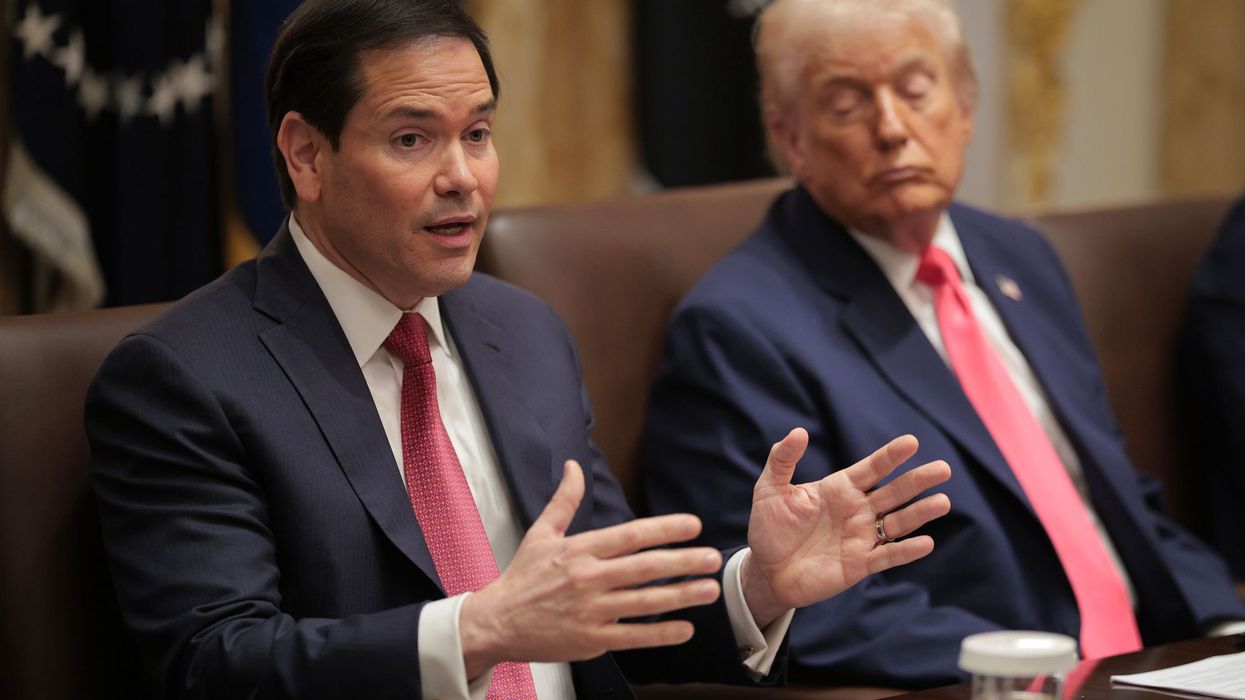October, 20 2009, 03:38pm EDT

For Immediate Release
Contact:
Lisa Nurnberger, Media Director, lnurnberger@ucs.org
Can We Afford More Subsidies for Nuclear Power?
WASHINGTON
The
Senate may finally start debating climate and energy legislation now
that Sens. Barbara Boxer (D-Calif.) and John Kerry (D-Mass.) have
introduced the Clean Energy Jobs and American Power Act. But the
addition of a nuclear provision to the bill raises some questions. What
will be the fate of the so-called nuclear power renaissance, and to
what extent will taxpayers be asked to underwrite it?
Expanding nuclear power capacity in the United States
beyond the current fleet of 104 reactors -- which do not emit global
warming pollution when operating -- has the potential to help combat
climate change. Nuclear power currently generates about 20 percent of U.S.
electricity, and building more reactors could reduce the 50 percent
market share held by coal-fired power plants, the nation's primary
source of global warming emissions.
But
is nuclear power a climate solution we can afford? The short answer,
according to the Union of Concerned Scientists (UCS), is no. As UCS
Nuclear Energy and Climate Change Project Manager Ellen Vancko notes,
"Even if you discount nuclear power's current security and safety
problems, the skyrocketing cost of construction could be the industry's
Achilles' heel."
Wall
Street has made it clear that it will not finance the nuclear
industry's expansion without federal loan guarantees because of the
high risks and uncertain costs associated with such investments. A
recent Moody's report characterized investments new nuclear plants as a
"bet the farm" risk, stating that companies that build new reactors
will take on a higher business and operating risk profile, which will
threaten their credit ratings.
To
circumvent these financing challenges, the nuclear industry is
supporting legislation that was passed by the Senate Committee on
Energy and Natural Resources in June. That bill, S. 1462, would
underwrite the industry's expansion by creating a new Clean Energy
Deployment Administration (CEDA). Although CEDA's provisions are poorly
understood, the implications of this pending legislation are enormous,
according to UCS.
A
recent Congressional Budget Office (CBO) report concluded that S. 1462
would exempt the Department of Energy's (DOE) Loan Guarantee Program,
which was established under the Energy Policy Act of 2005, from Federal Credit Reform Act provisions requiring such programs to be funded each year by congressional appropriation. "The
effect of this exemption," the CBO stated, "would be to give DOE
permanent authority to guarantee such loans without further legislative
action or limitations." That means DOE could give
virtually unlimited loan guarantees to expensive and risky new
technologies, all underwritten by taxpayers without congressional
oversight. (For the CBO report, go to www.cbo.gov/doc.cfm?index=10637.)
"The
Congressional Budget Office estimates that the Energy Department could
hand out more than $130 billion to nuclear and fossil fuel energy
projects," Vancko said. "That's a lot of money. But what is even
more alarming is that CBO's calculation is based solely on pending
Energy Department loan guarantee applications. It does not include an
estimation of the hundreds of billions of dollars in additional loan
guarantees that could be approved by a new energy bank if this program
becomes law."
Vancko recently co-authored a briefing paper, "Nuclear Power: A Resurgence We Can't Afford," which is available at www.ucsusa.org/nuclear_power/nuclear_power_and_global_warming/nuclear-power-resurgence.html.
In it she provides a clear-eyed look at the nuclear industry's history
of cost overruns, projections of current reactor construction costs,
comparisons with cleaner, more cost-effective low-carbon energy
options, and the potential risks to taxpayers from overly generous
federal subsidies and loan guarantees. Another UCS briefing paper from
earlier this year, "Nuclear Loan Guarantees: Another Taxpayer Bailout
Ahead?," should also be of interest.
For that report, go to www.ucsusa.org/nuclear_power/nuclear_power_and_global_warming/nuclear-loan-guarantees.html.
Ellen Vancko is available for interviews. Please call Elliott Negin at 202-331-5439.
The Union of Concerned Scientists is the leading science-based nonprofit working for a healthy environment and a safer world. UCS combines independent scientific research and citizen action to develop innovative, practical solutions and to secure responsible changes in government policy, corporate practices, and consumer choices.
LATEST NEWS
'Do Not Become Inured': Death Toll From Trump Boat Strikes Tops 100 After Latest Murders
"This is premeditated killing outside of armed conflict. We call that murder," said one expert.
Dec 19, 2025
The US military on Thursday bombed two vessels in the eastern Pacific, killing at least five people and pushing the death toll from the Trump administration's lawless military campaign in international waters above 100.
Thursday's strikes marked the third time this week that the US military has bombed boats operated by people accused, without evidence, of smuggling drugs. None of the dozens of strikes that have now killed at least 105 people since early September have been authorized by Congress, and legal experts at home and abroad have said the attacks clearly constitute murder.
Brian Finucane, a senior adviser with the US Program at the International Crisis Group, warned against allowing the Trump administration to normalize and escape accountability for its extrajudicial killings.
"The lawless killing spree continues. Do not become inured," Finucane wrote on social media. "This is premeditated killing outside of armed conflict. We call that murder."
As with previous attacks, the Trump administration attached a short video clip to its announcement of the Thursday strikes, which came amid mounting fears that President Donald Trump is dragging the US into an illegal war with Venezuela and possibly other South American countries.
On Dec. 18, at the direction of @SecWar Pete Hegseth, Joint Task Force Southern Spear conducted lethal kinetic strikes on two vessels operated by Designated Terrorist Organizations in international waters. Intelligence confirmed that the vessels were transiting along known… pic.twitter.com/CcCyOgYRto
— U.S. Southern Command (@Southcom) December 19, 2025
But US Defense Secretary Pete Hegseth is refusing to release footage of at least one of the deadly strikes that he authorized with a verbal order to "kill everybody" onboard the targeted vessel.
"We’re not going to release a top secret, full, unedited video of that to the general public,” Hegseth told reporters earlier this week, referring to footage of a September 2 attack in the Caribbean that killed the survivors clinging to wreckage from an initial strike.
The ACLU's Jeffrey Stein and Christopher Anders wrote Thursday that "if a president can murder civilians at sea and keep the legal justifications secret, we should all be concerned."
"The harm is even worse when basic factual evidence, such as full videos and orders, is also hidden from the American people," they continued. "Transparency can’t wait while the government murders more people. That’s why we’re asking everyone to send a message to their representatives in Congress urging them to act now. Demanding answers, insisting on public hearings, and refusing to accept secret law as a license to kill, is how we can all help stop these unlawful strikes and defend the basic principle that no one—not even the president—is above the law."
The latest bombings came a day after House Republicans blocked a pair of resolutions aimed at stopping the Trump administration's unauthorized boat strikes and march to war with Venezuela.
In the Senate, Ruben Gallego is pushing a new resolution that "orders the US Armed Forces to immediately cease hostilities against vessels in the Caribbean Sea and the eastern Pacific Ocean unless authorized by Congress."
"If the president believes the use of military force is necessary, he needs to come talk to Congress first and make that case. The decision to use military force is one that requires serious debate, and the power to declare war unambiguously belongs to Congress under the Constitution,” said Gallego. “As an Iraq war veteran, I know the costs of rushing into an unnecessary war and that the American people will not stand for it.”
But Trump insisted Thursday that he doesn't "have to" go to Congress before taking military action.
Asked if war with Venezuela is a possibility, Trump said, "I don’t rule it out."
Keep ReadingShow Less
ICC Slams New US Sanctions on Judges as 'Flagrant Attack' on Rule of Law
"When judicial actors are threatened for applying the law, it is the international legal order itself that is placed at risk," the court said.
Dec 18, 2025
The International Criminal Court and human rights groups on Thursday condemned new US sanctions on two more of the tribunal's judges, which brought the total number of sanctioned ICC jurists to 11 amid the Trump administration's escalating campaign of retaliation against people and institutions seeking to hold Israel and the United States accountable for their alleged crimes.
"Today, I am designating two International Criminal Court (ICC) judges, Gocha Lordkipanidze of Georgia and Erdenebalsuren Damdin of Mongolia, pursuant to Executive Order 14203, 'Imposing Sanctions on the International Criminal Court,'" US Secretary of State Marco Rubio said in a statement, referring to President Donald Trump's February edict.
"These individuals have directly engaged in efforts by the ICC to investigate, arrest, detain, or prosecute Israeli nationals, without Israel’s consent, including voting with the majority in favor of the ICC’s ruling against Israel’s appeal on December 15," Rubio added, referencing Monday's rejection of an Israeli bid to block a probe into alleged war crimes committed during the genocidal two-year war on Gaza.
Although Israel and the US are not ICC members and do not recognize the Hague-based tribunal's jurisdiction, Palestine is a state party to the Rome Statute governing the court. The treaty says that individuals from nonsignatory nations can be held liable for crimes committed in the territory of a member state.
Last year, the ICC issued warrants for the arrest of Israeli Prime Minister Benjamin Netanyahu and former Israeli Defense Minister Yoav Gallant for alleged crimes against humanity and war crimes in Gaza, including murder and forced starvation in a war that has left more than 250,000 Palestinians dead, wounded, or missing.
The Trump administration had previously sanctioned nine other ICC jurists: Chief Prosecutor Karim Khan (United Kingdom), Deputy Prosecutor Nazhat Shameem Khan (Fiji), Deputy Prosecutor Mame Mandiaye Niang (Senegal), Judge Solomy Balungi Bossa (Uganda), Judge Luz del Carmen Ibáñez Carranza (Peru), Judge Reine Adelaide Sophie Alapini-Gansou (Benin), Judge Beti Hohler (Slovenia), Judge Nicolas Yann Guillou (France), and Judge Kimberly Prost (Canada).
The affected judges have recently described how the US sanctions have left them and their families—who are also blacklisted—"wiped out economically and socially."
Responding to the new US punitive measures, the ICC said Thursday that "these sanctions are a flagrant attack against the independence of an impartial judicial institution which operates pursuant to the mandate conferred by its states parties from across regions."
"Such measures targeting judges and prosecutors who were elected by the states parties undermine the rule of law," the court continued. "When judicial actors are threatened for applying the law, it is the international legal order itself that is placed at risk."
"As previously stated, the court stands firmly behind its personnel and behind victims of unimaginable atrocities," the ICC added. "It will continue to carry out its mandate with independence and impartiality, in full accordance with the Rome Statute and in the interest of victims of international crimes."
Human Rights Watch also slammed the new US sanctions, which the group called "the latest attempt by the Trump administration to blatantly interfere with independent justice."
The US government has imposed sanctions on two additional ICC judges in order to shield Israeli officials from charges of grave international crimes.These sanctions are the latest attempt by the Trump administration to blatantly interfere with independent justice.
[image or embed]
— Human Rights Watch (@hrw.org) December 18, 2025 at 12:01 PM
Amnesty International's Center for International Justice lamented that "once again, the US administration is attacking international justice—sanctioning two ICC judges. This cannot be normalized."
"States must firmly oppose US threats and sanctions and uphold the court’s ability to pursue accountability," the group added, "even against the most powerful perpetrators."Keep ReadingShow Less
Rights Group Condemns 'Terror' and 'Lawlessness' Spread by Trump's Masked Thugs
“Allowing masked, unidentified agents to roam communities and apprehend people without identifying themselves erodes trusts in the rule of law and creates a dangerous vacuum where abuses can flourish."
Dec 18, 2025
As masked government agents—an oft-employed terror tool of authoritarian regimes—run roughshod amid the Trump administration's mass deportation effort, a leading human rights group on Thursday called on Congress to investigate abuses perpetrated by federal officers against immigrants and US citizens alike.
Federal immigration enforcement agents "now commonly operate masked and without visible identification, compounding the abusive and unaccountable nature of the Trump administration’s mass deportation campaign," Human Rights Watch (HRW) said. "The indefinite and widespread nature of these practices is fundamentally inconsistent with the United States’ obligations to ensure that law enforcement abuses are investigated and met with accountability."
HRW continued:
Since President Donald Trump’s return to office in January 2025, his administration has carried out an abusive campaign of immigration raids and arrests, primarily of people of color, across the country. Many of the raids target places where Latino people work, shop, eat, and live. The agents have seized people in courthouses and at regularly scheduled appointments with immigration officials, as well as in places of worship, schools, and other sensitive locations. Many raids have been marked by the sudden and unprovoked use of force without any justification, creating a climate of fear in many immigrant communities.
Drawing upon interviews with 18 people who were arrested or witnessed arrests by unidentified federal agents, HRW highlighted the "terror" and helplessness felt by victims of such "lawlessness."
“It was a horrible feeling,” said Rümeysa Öztürk, a Turkish PhD student at Tufts University who was illegally snatched off a Massachusetts street in March and whisked off to an US Immigration and Customs Enforcement (ICE) lockup in Louisiana after she published an opinion piece in a student newspaper advocating divestment from apartheid Israel as it waged a genocidal war on Gaza. With Öztürk having committed no crime, a federal judge ordered her release 45 days later.
“I didn’t think that they were the police because I had never seen police approach and take someone away like this," Öztürk said of her arrest—which bystanders likened to a kidnapping. "I thought they were people who were doxing me, and I was genuinely very afraid for my safety... As a woman who’s traveled and lived alone in various countries for my studies, I’ve never experienced intense fear for my safety—until that moment.”
Operatives with ICE—part of the Department of Homeland Security (DHS)—and other agencies have violently attacked not only unauthorized immigrants but also members of their communities including US citizens, activists, journalists, and others. The agents are often wearing masks but not badges or other identifiers, making it very difficult to hold abusers accountable.
While ICE tries to justify its widespread practice of masking agents “to prevent doxing,” HRW stressed that "this kind of generalized, blanket justification for concealing officers’ identity is not compatible with US human rights obligations, except when necessary and proportionate to address particular safety concerns."
"Anonymity also weakens deterrence, fosters conditions for impunity, and chills the exercise of rights," the group added.
It also sows terror, as Republican-appointed US District Judge William Young noted in a ruling earlier this year: "ICE goes masked for a single reason—to terrorize Americans into quiescence. Small wonder ICE often seems to need our respected military to guard them as they go about implementing our immigration laws. It should be noted that our troops do not ordinarily wear masks. Can you imagine a masked marine? It is a matter of honor—and honor still matters."
HRW also noted that "in recent months, media outlets have reported on people posing as federal agents kidnapping, sexually assaulting, and extorting victims, exploiting fears of immigration enforcement."
“Allowing masked, unidentified agents to roam communities and apprehend people without identifying themselves erodes trusts in the rule of law and creates a dangerous vacuum where abuses can flourish, exacerbating the unnecessary violence and brutality of the arrests,” HRW associate crisis and conflict director Belkis Wille said in a statement Thursday.
HRW called on Congress to "investigate the brutality of the ongoing immigration enforcement activities, including the specific impacts of unidentifiable agents carrying out stops and arrests on impeding investigations and accountability efforts."
In addition to efforts by state legislatures to unmask federal agents, congressional Democrats have demanded ICE and other officers identify themselves, and have introduced legislation—the No Secret Police Act and No Masks for ICE Act in the House and VISIBLE Act in the Senate—that would compel them to do so.
“If you uphold the peace of a democratic society, you should not be anonymous,” No Secret Police Act lead co-sponsor Rep. Adriano Espaillat (D-NY) said at the time of the bill's introduction in June. “DHS and ICE agents wearing masks and hiding identification echoes the tactics of secret police authoritarian regimes—and deviates from the practices of local law enforcement, which contributes to confusion in communities.”
Keep ReadingShow Less
Most Popular


